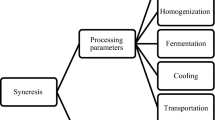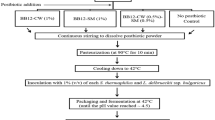Abstract
Lactic acid bacteria (LAB) that metabolize sugars to obtain energy and produce a large amount of lactate through the process are well known for their benefits. However, they can be used on a large scale only when good storage stability is guaranteed. The vitality and stability of several LAB strains were effectively protected in this investigation by L-theanine at 1% of the appropriate concentration (Lactiplantibacillus plantarum MG5023, Enterococcus faecium MG5232, Lactococcus lactis MG4668, Streptococcus thermophilus MG5140, and Bifidobacterium animalis subsp. lactis MG741). The inclusion of L-theanine as a protective agent significantly enhanced the viability of all strains throughout the freeze-drying process compared to that of the non-coated probiotics. The efficacy of L-theanine in improving bacterial stability and survivability was evaluated using accelerated stability tests, gastrointestinal (GI) tract survivability tests, and adhesion assays with intestinal epithelial cells. The cell surface was covered with substances including L-theanine, according to morphological findings, providing efficient defense against a variety of external stresses. Therefore, by exerting anti-freezing and anti-thawing properties, the adoption of L-theanine as a new and efficient protective agent may improve the stability and viability of a variety of probiotics.



Similar content being viewed by others
Data availability
All data are presented in the paper.
References
Abadias M, Teixidó N, Usall J, Benabarre A, Vinas I (2001) Viability, efficacy, and storage stability of freeze-dried biocontrol agent Candida sake using different protective and rehydration media. J Food Prot 64(6):856–861
Albadran HA, Chatzifragkou A, Khutoryanskiy VV, Charalampopoulos D (2015) Stability of probiotic Lactobacillus plantarum in dry microcapsules under accelerated storage conditions. Food Res Int 74:208–216
Alp D, Kuleaşan H (2019) Adhesion mechanisms of lactic acid bacteria: conventional and novel approaches for testing. World J Microbiol Biotechnol 35:1–9
Baral KC, Bajracharya R, Lee SH, Han H-K (2021) Advancements in the pharmaceutical applications of probiotics: dosage forms and formulation technology. Int J Nanomed 16:7535
Bauer SAW, Schneider S, Behr J, Kulozik U, Foerst P (2012) Combined influence of fermentation and drying conditions on survival and metabolic activity of starter and probiotic cultures after low-temperature vacuum drying. J Biotechnol 159(4):351–357
Chaffanel F, Charron-Bourgoin F, Soligot C, Kebouchi M, Bertin S, Payot S, Le Roux Y, Leblond-Bourget N (2018) Surface proteins involved in the adhesion of Streptococcus salivarius to human intestinal epithelial cells. Appl Microbiol Biotechnol 102:2851–2865
Chen X, Li L, Yang F, Wu J, Wang S (2020) Effects of gelatin-based antifreeze peptides on cell viability and oxidant stress of Streptococcus thermophilus during cold stage. Food Chem Toxicol 136:111056
Chen B, Wang X, Li P, Feng X, Mao Z, Wei J, Lin X, Li X, Wang L (2023) Exploring the protective effects of freeze-dried Lactobacillus rhamnosus under optimized cryoprotectants formulation. LWT 173:114295. https://doi.org/10.1016/j.lwt.2022.114295
Crittenden R, Weerakkody R, Sanguansri L, Augustin M (2006) Synbiotic microcapsules that enhance microbial viability during nonrefrigerated storage and gastrointestinal transit. Appl Environ Microbiol 72(3):2280–2282
Cui S, Hu K, Qian Z, Mao B, Zhang Q, Zhao J, Tang X, Zhang H (2022) Improvement of freeze-dried survival of Lactiplantibacillus plantarum based on cell membrane regulation. Microorganisms 10(10):1985
Hidese S, Ogawa S, Ota M, Ishida I, Yasukawa Z, Ozeki M, Kunugi H (2019) Effects of L-theanine administration on stress-related symptoms and cognitive functions in healthy adults: a randomized controlled trial. Nutrients 11(10):2362
Jalali M, Abedi D, Varshosaz J, Najjarzadeh M, Mirlohi M, Tavakoli N (2011) Stability evaluation of freeze-dried Lactobacillus paracasei subsp. tolerance and Lactobacillus delbrueckii subsp. bulgaricus in oral capsules. Res Pharm Sci 7(1):31–36
Kailasapathy K (2006) Survival of free and encapsulated probiotic bacteria and their effect on the sensory properties of yoghurt. LWT-Food Sci Technol 39(10):1221–1227
Kim JK, Shin EC, Park HG (2015) Fructooligosaccharides decreased the ability of probiotic Escherichia coli Nissle 1917 to adhere to co-cultures of human intestinal cell lines. J Korean Soc Appl Biol Chem 58(1):45–52
Kim S Il, Kim JW, Kim KT, Kang CH (2021) Survivability of collagen-peptide microencapsulated lactic acid bacteria during storage and simulated gastrointestinal conditions. Fermentation 7(3). https://doi.org/10.3390/fermentation7030177
Krausova G, Hyrslova I, Hynstova I (2019) In vitro evaluation of adhesion capacity, hydrophobicity, and auto-aggregation of newly isolated potential probiotic strains. Fermentation 5(4):100
Lee JY, Kang C-H (2022) Probiotics alleviate oxidative stress in H2O2-exposed hepatocytes and t-BHP-induced C57BL/6 mice. Microorganisms 10(2):234
Lee WK, Kim TI, Park S, Park HK, Hong JT (2010) Anxiolytic effect of a combination of green tea extract and L-theanine. Lab Anim Res 26(1):63–68
Makinen K, Berger B, Bel-Rhlid R, Ananta E (2012) Science and technology for the mastership of probiotic applications in food products. J Biotechnol 162(4):356–365
Menezes MF da SC de, Silva TM da, Etchepare M de A, Fonseca B de S, Sonza VP, Codevilla CF, Barin JS, Silva C de B da, Menezes CR de (2019) Improvement of the viability of probiotics (Lactobacillus acidophilus) by multilayer encapsulation. Ciência Rural 49:e20181020
Nguyen TH, Kim J-S, Kwon H-J, Kang C-H (2023) The Effect of a glutathione (GSH)-containing cryo-protectant on the viability of probiotic cells using a freeze-drying process. Fermentation 9(2):187
Nguyen TH, Kim Y, Kim JS, Jeong Y, Park HM, Kim JW, Kim JE, Kim H, Paek NS, Kang CH (2020) Evaluating the cryoprotective encapsulation of the lactic acid bacteria in simulated gastrointestinal conditions. Biotechnol Bioprocess Eng 25(2):287–292
Obradović N, Volić M, Nedović V, Rakin M, Bugarski B (2022) Microencapsulation of probiotic starter culture in protein–carbohydrate carriers using spray and freeze-drying processes: implementation in whey-based beverages. J Food Eng 321:110948
Oniszczuk A, Oniszczuk T, Gancarz M, Szymańska J (2021) Role of gut microbiota, probiotics and prebiotics in the cardiovascular diseases. Molecules 26(4):1172
Palzer S (2009) Food structures for nutrition, health and wellness. Trends Food Sci Technol 20(5):194–200. https://doi.org/10.1016/J.TIFS.2009.02.005
Romyasamit C, Saengsuwan P, Boonserm P, Thamjarongwong B, Singkhamanan K (2022) Optimization of cryoprotectants for freeze-dried potential probiotic Enterococcus faecalis and evaluation of its storage stability. Drying Technol 40(11):2283–2292. https://doi.org/10.1080/07373937.2021.1931294
Saeed M, Naveed M, Arif M, Kakar MU, Manzoor R, Abd El-Hack ME, Alagawany M, Tiwari R, Khandia R, Munjal A (2017) Green tea (Camellia sinensis) and l-theanine: medicinal values and beneficial applications in humans—a comprehensive review. Biomed Pharmacother 95:1260–1275
Saeed M, Xu Y, Zhang T, Ren Q, Sun C (2019) 16S ribosomal RNA sequencing reveals a modulation of intestinal microbiome and immune response by dietary L-theanine supplementation in broiler chickens. Poult Sci 98(2):842–854. https://doi.org/10.3382/ps/pey394
Siaterlis A, Deepika G, Charalampopoulos D (2009) Effect of culture medium and cryoprotectants on the growth and survival of probiotic lactobacilli during freeze drying. Lett Appl Microbiol 48(3):295–301
Son SJ, Koh JH, Park MR, Ryu S, Lee WJ, Yun B, Lee JH, Oh S, Kim Y (2019) Effect of the Lactobacillus rhamnosus strain GG and tagatose as a synbiotic combination in a dextran sulfate sodium-induced colitis murine model. J Dairy Sci 102(4):2844–2853. https://doi.org/10.3168/jds.2018-15013
Teixeira PC, Castro MH, Malcata FX, Kirby RM (1995) Survival of Lactobacillus delbrueckii subsp. bulgaricus following spray-drying. J Dairy Sci 78(5):1025–1031
Vanhee LME, Goemé F, Nelis HJ, Coenye T (2010) Quality control of fifteen probiotic products containing Saccharomyces boulardii. J Appl Microbiol 109(5):1745–1752. https://doi.org/10.1111/j.1365-2672.2010.04805.x
Weinbreck F, Bodnár I, Marco ML (2010) Can encapsulation lengthen the shelf-life of probiotic bacteria in dry products? Int J Food Microbiol 136(3):364–367
Williams J, Sergi D, McKune AJ, Georgousopoulou EN, Mellor DD, Naumovski N (2019) The beneficial health effects of green tea amino acid l-theanine in animal models: promises and prospects for human trials. Phytother Res 33(3):571–583
Yuan Y, Yin M, Chen L, Liu F, Chen M, Zhong F (2022) Effect of calcium ions on the freeze-drying survival of probiotic encapsulated in sodium alginate. Food Hydrocolloids 130:107668. https://doi.org/10.1016/j.foodhyd.2022.107668
Yuste A, Arosemena EL, Calvo MÀ (2021) Study of the probiotic potential and evaluation of the survival rate of Lactiplantibacillus plantarum lyophilized as a function of cryoprotectant. Sci Rep 11(1):19078
Zhao G, Zhang G (2005) Effect of protective agents, freezing temperature, rehydration media on viability of malolactic bacteria subjected to freeze-drying. J Appl Microbiol 99(2):333–338
Funding
This research received no external funding
Author information
Authors and Affiliations
Contributions
Conceptualization, C.-H.K.; methodology H.-J.K., T.H.N., and J.-S.K.; formal analysis, H.-J.K., T.H.N., and J.-S.K.; investigation, H.-J.K., T.H.N., and J.-S.K.; data curation H,-J.K. and T.H.N.; writing-original draft preparation, H.-J.K.; writing-review and editing, H.-J.K., T.H.N., and C.-H.K.; visualization, H.-J.K.; supervision, C.-H.K.; project administration, C.-H.K. All authors have read and agreed to the published version of the manuscript.
Corresponding author
Ethics declarations
Ethics approval
Not applicable.
Consent to participate
Not applicable.
Consent for publication
Not applicable.
Competing interests
The authors declare no competing interests.
Additional information
Publisher's Note
Springer Nature remains neutral with regard to jurisdictional claims in published maps and institutional affiliations.
Rights and permissions
Springer Nature or its licensor (e.g. a society or other partner) holds exclusive rights to this article under a publishing agreement with the author(s) or other rightsholder(s); author self-archiving of the accepted manuscript version of this article is solely governed by the terms of such publishing agreement and applicable law.
About this article
Cite this article
Kwon, HJ., Nguyen, T.H., Kim, JS. et al. The protective effect of L-theanine addition to a cryoprotectant on the storage viability of lactic acid bacteria. Int Microbiol (2023). https://doi.org/10.1007/s10123-023-00444-z
Received:
Revised:
Accepted:
Published:
DOI: https://doi.org/10.1007/s10123-023-00444-z




